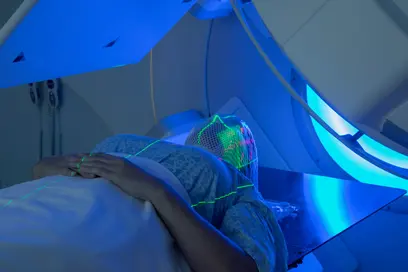Lymphomas are cancers that originate from immune cells called lymphocytes. Among over 50 subtypes, Burkitt lymphoma is the most common type of lymphoma affecting children, but it also occurs in adults. It was the first lymphoma where a recurrent genetic change known as Burkitt translocation was identified back in the 1970s. This rearrangement of genetic material between two chromosomes – the structures containing the genetic material – leads to activation of the MYC oncogene. However, activation of the MYC gene alone is not sufficient for cells to turn cancerous. The network’s coordinator, Prof. Dr. med. Reiner Siebert, who is director of the Institute of Human Genetics of the Schleswig Holstein University Hospital (UKSH), Kiel Campus, and professor at Kiel University, says: “The new research results show that further functions of the cells apparently need to be disrupted for MYC oncogene activation to lead to malignant transformation."
In the work now published, the scientists and clinicians participating in the ICGC MMML-Seq project took a highly comprehensive approach: They not only completely sequenced the genomes of four types of Burkitt lymphoma and studied them for disease-relevant mutations but also collected data about changes in the activity of genes and their regulation. “Using the systematic analysis, we could identify between 1,957 and 5,707 changes in the genome of Burkitt lymphoma compared to normal cells," says Dr. Matthias Schlesner of the Theoretical Bioinformatics Division at DKFZ in Heidelberg, one of the coordinating authors of the current publication. “But only 119 genetic changes actually led to protein changes." The researchers further analyzed these genes. “Our studies revealed that a gene called ID3 (inhibitor of DNA binding 3) was altered in 68% of Burkitt lymphomas and almost never was in other lymphomas," says the study’s first author, Dr. Julia Richter from the Institute of Human Genetics in Kiel. Dr. Benedikt Brors of DKFZ adds: “This makes Burkitt lymphoma substantially different from many other cancer entities, whose genomes are much less uniform." Hence, the studies have identified a new molecular marker for diagnostic differentiation between Burkitt lymphoma and other lymphomas.
ICGC MMML-Seq (Molecular Mechanisms in Malignant Lymphoma by Sequencing) is a research network where clinicians and scientists of various universities, the German Cancer Research Center (DKFZ) and the European Molecular Biology Laboratory (EMBL) in Heidelberg collaborate closely to unravel the causes of malignant lymphomas. The network is coordinated by the Institute of Human Genetics of the Christian Albrecht University in Kiel / Schleswig Holstein University Hospital (UKSH), Kiel Campus. The network’s goal is to systematically generate catalogs of defects in the genomes of 250 B-cell lymphomas, of which Burkitt lymphoma is a subtype, by sequencing the cancer cell genomes.
The ICGC MMML-Seq network is part of the International Cancer Genome Consortium (ICGC). The goal of this ambitious worldwide cancer project is to obtain a comprehensive description of genomic and epigenomic changes in 50 different cancer types of main importance. This will serve as a basis for developing novel diagnostic approaches and treatment strategies. Two additional German projects in ICGC are coordinated by the German Cancer Research Center. One of them is about pediatric brain cancer, the other one about prostate cancer in younger men. All cancer genome data from the three German ICGC projects are joined together at DKFZ under the leadership of Professor Roland Eils.
The Federal Ministriy of Education and Research (BMBF) and the German Cancer Aid (Deutsche Krebshilfe) fund the work of the German ICGC projects.
For more information on the project please visit:
ICGC MMML-Seq: www.icgc-lymphome.de
ICGC: www.icgc.org
Julia Richter et al.: Recurrent mutation of the ID3 gene in Burkitt lymphoma identified by integrated genome, exome and transcriptome sequencing, Nature Genetics, published online 11 November 2012; doi:10.1038/ng.2469



